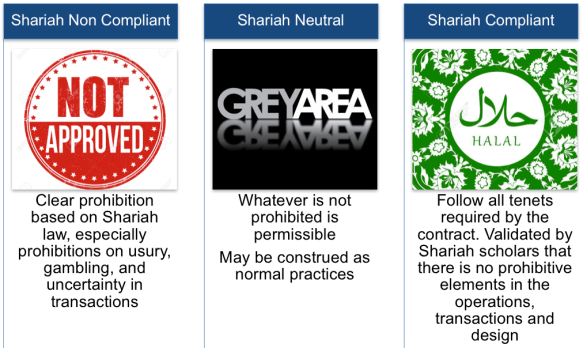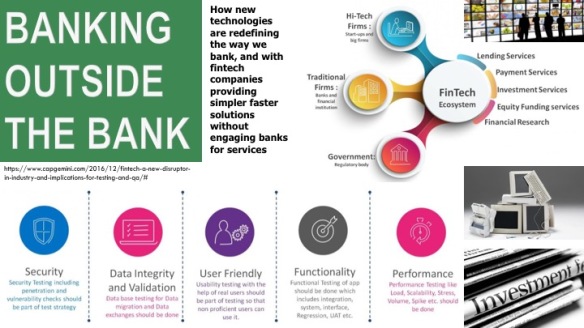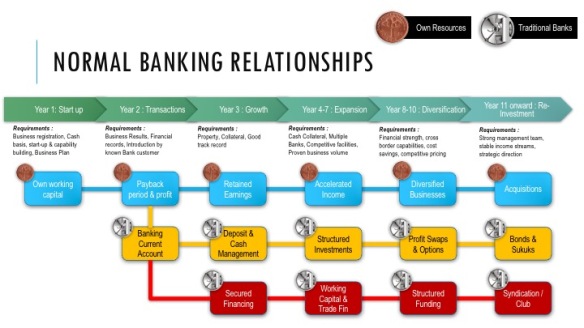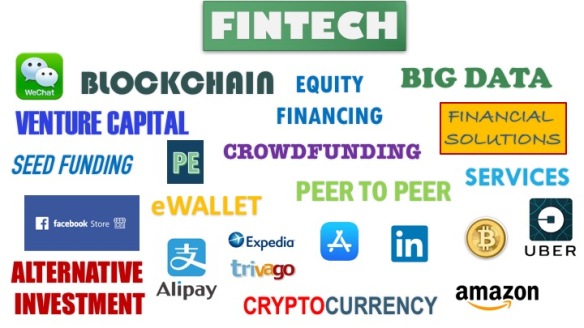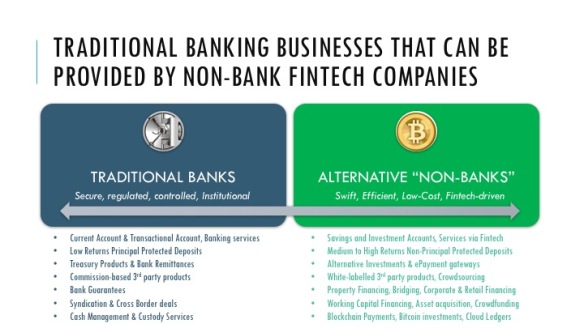THE SHARIAH CONSIDERATION FOR E-WALLETS AND PAYMENT APPS.
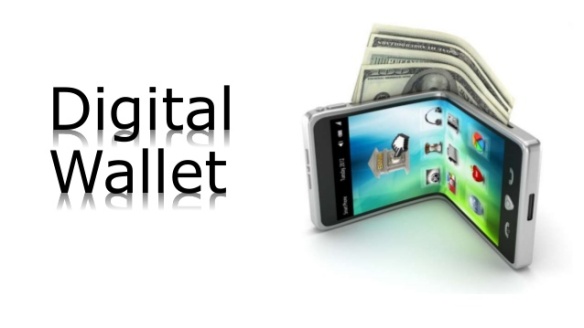
Apps are everywhere. Everyone has a mobile phone where people start to get used to online banking, e-money, e-wallets and e-payment. All at the touch of the screen. I use it extensively and there are a few very convenient ways to survive a city without the need of actual cash in your wallet. Everything is digital and floating somewhere out in the clouds.
As I no longer use credit cards, I relied heavily on Debit Cards as my main payment medium which is linked to my Islamic Current and Savings Account. So the Debit Card deducts the amount from my account for each purchase for settlement. Technically, it is a Service (Ujr) where the Debit Card serves as a payment instrument, linked to the account based on Wadiah or Qard or Tawarruq or Mudarabah.
But at the same time, I am all-in into the tech-thingy as well. And no doubt, there must be a future in these thingies… For the past few months, I have been using these few apps. Here is a short review of 2 apps that I have to admit as my favourites.
Boost was one of the first eWallet that I downloaded. It requires me to “fund” the wallet, and when you make payment using the money in the eWallet, you can shake your phone to get “digital rewards”. So far, I have only gotten maximum RM2 for my phone shaking, with the promise of random potential rewards. I am motivated to shake, maybe I can win the grand prize (it changes from period to period). What is the Shariah contract here? Boost eWallet is funded from my Islamic bank account, so what is the contract for the eWallet? Is it a Qard (loan), or Wadiah (safekeeping)? We potentially may get a return (profit?) after a purchase by shaking our phone. Is that considered discretionary returns i.e. Hibah? Promised returns? In a way it is a promised returns but the amount is based on luck. And what does Boost do with our money when we are not using it and is it used for Shariah compliant purposes? Is it potentially a Musyarakah (partnership) or Mudarabah (profit-sharing) arrangement as customers are the Rab Ul Mal (Fund Provider) and Boost is the Mudarib (Manager) or Shirkah (Partnership). The Capital is guaranteed so it is maybe a deposit arrangement. The fact that we can transfer it back to our account sound like it is a Qard arrangement where we can ask our cash back on demand. But getting to shake for a guaranteed reward (even though it is RM0.20) may pose Qard as problematic for offering rewards.
 Fave is another app that I use, which is slightly different from Boost. Where Boost is an eWallet, Fave is a Payment Gateway where the cash is taken directly from your Bank account to settle a purchase. And depending on the merchant, you get cash back on your purchases which could be deducted from the your next purchase amount, ranging from 5% to 10% (some don’t offer cashback, but rarely). In Fave’s case, Fave do not retain any cash from you, as your cash still remain in your Bank account. So Fave seems to be more of an Ujrah arrangement, where we presume the service fee is collected from merchants instead of you. To encourage you to use this App so that Fave collects their fees, Fave gives the cash-back based on % of your purchases which seems like Hibah (gift) to me. For example, I pay for RM100 and gets a “cash-back” of RM5 for my next purchase at the merchant, so that sounds like a gift. Or is it a commission that we get for using the App, redeemable for the next purchase? I don’t know.
Fave is another app that I use, which is slightly different from Boost. Where Boost is an eWallet, Fave is a Payment Gateway where the cash is taken directly from your Bank account to settle a purchase. And depending on the merchant, you get cash back on your purchases which could be deducted from the your next purchase amount, ranging from 5% to 10% (some don’t offer cashback, but rarely). In Fave’s case, Fave do not retain any cash from you, as your cash still remain in your Bank account. So Fave seems to be more of an Ujrah arrangement, where we presume the service fee is collected from merchants instead of you. To encourage you to use this App so that Fave collects their fees, Fave gives the cash-back based on % of your purchases which seems like Hibah (gift) to me. For example, I pay for RM100 and gets a “cash-back” of RM5 for my next purchase at the merchant, so that sounds like a gift. Or is it a commission that we get for using the App, redeemable for the next purchase? I don’t know.
THE SHARIAH IMPLICATION
When we use these Apps, it is not clear the modus operandi of the operator and it seems obvious that no Shariah consideration took place on the usage as well as the contractual relationship. Should there even be any consideration or is it necessary?
In my view, a lot of products and services in the market fall into the category of “Shariah Neutral” instead of Shariah Compliant / Non-Shariah Compliant. For example a transaction may look like an Ijarah where the payment is based on rental but its documents may not be completed or contain all the tenets of the contract. Without the elements of all the shariah tenets, will it fall into either Shariah-neutral or non-compliant?
The question : If the transaction is Shariah Neutral, is there any requirement to look at by Shariah scholars? How do we decide if it is Shariah Neutral and therefore should be ignored from Shariah oversight?

Have Shariah Scholars considered the digital world or are we still only concerned on the traditional products to see their process validity and documentation? I feel there is a growing gap of what we see developing in the fintech, mobile banking and digital commerce space where Shariah may or may not have an issue on.
For example, the issue of Aqad in the digital space. The questions that I have are the following:
- Are the minimum tenets the same between a transaction between people, and a digital transaction? For example the tenets of a Murabahah in the digital space. Buyer / Seller / Price / Asset / Offer Acceptance. Will the tenets in the physical world still apply in a digital world?
- I presume the Buyer is the customer. But the Seller is a program that shows a picture of a product and is automated. Will the Seller as an Apps (representing the Seller) qualify as a real seller under the tenet? Generally I would think so but the responsibilities of the Seller must be clear somewhere.
- Would an Apps Pop-Up notice sufficient to conclude an Aqad. These are sequential programming that gives notice/remark at certain points and can be timed to meet Shariah requirements. Is this sufficient for Shariah?
Maybe I have been too distracted by work that I have missed these discussions, if it has happened before and concluded.
SHARIAH NEUTRAL : IS THERE A NEED TO VALIDATE?
As far as I understand it, Shariah Neutral means a product or services that is not breaching any Shariah rules or prohibited items in its execution. For example, a remittance service, where the customer gives cash to a remittance company to transfer the amount to another party. The company provides a service and earns a commission for the service. There are no prohibited elements in such service even to the point that generally the tenets of the contract are deemed as embedded in the processes, intention and basic forms and documents. You don’t see the arabic terms or formal contractual relationships mentioned; by virtue that there are no prohibited elements, we deemed it Shariah sufficient.
WHAT IS SHARIAH’S REAL VIEW OF SHARIAH-NEUTRAL?
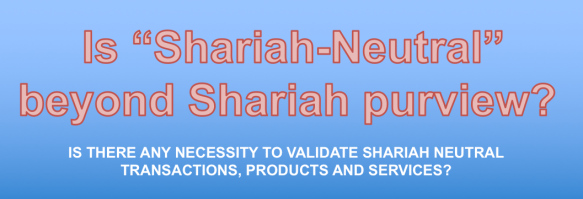
I may be ignorant in this area, but what is Shariah’s view on Shariah-Neutral transactions? Why is it deemed that certain transactions requires a written / documented contract with all relationships and responsibilities outlined and agreed upon for it to be Shariah-Compliant, while others are okay to remain in a Shariah-Neutral state and still be acceptable? What is the deciding criteria for qualification of Shariah-Compliant?
As we move into the digital world where buying and selling online become a norm, and payment of goods and services are effected via a mobile app, is there a need to see whether there is any presence of prohibited elements in the transactions? Is there a need to decide if there are elements of a Riba (usury), Ghrarar (uncertainty) or Maisir (gambling) in the transactions? How about justice, fairness and trickery in the documents or operations of a mobile commerce? Is it safe to assume at least Shariah-Neutral and therefore Shariah scholars can skip looking into it?
Can I now design a product that on the outset can look and feel consistent with a Shariah-Neutral approach? With more and more Apps for commercial transaction being introduced, should I start to think about avoiding the prohibitive elements, without the need of complicated documentation and Aqad? As long as it avoids the prohibited elements, I guess it can survive unquestioned.
Does Shariah have a view on Shariah-Neutral transactions? How far do they see to decide if a transaction is Shariah-Neutral and therefore “outside” their jurisdiction.
SUMMARY
As we look forward to living into a progressively digital world, I cannot help but wonder on the necessity to have Shariah oversight online. The Apps developer won’t be going to Shariah scholars to get Shariah endorsements anytime soon, but are they aware of what they developed contains any prohibitive elements from Shariah? Often we are left out of such discussions; perhaps we ourselves feels such development falls into Shariah-Neutral and therefore requires no oversight. But then how do we decide how it falls into Shariah-Neutral territory? Are there checklists we can refer to?
These are the things that comes to my mind while I wait in line to purchase my next drink. And wondering how much I will get from shaking my phone for the rewards. I am hoping for something more than RM5 this time. Happy shaking your phone. What a different world we are living in now. Wallahualam.


